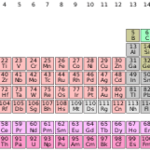The Elements of Chemistry: Exploring the Building Blocks of the Universe
Welcome to our website, where we delve into the fascinating world of chemistry and the fundamental elements that make up our universe. Chemistry is the study of matter, its properties, composition, and the changes it undergoes. Join us as we explore the elements of the periodic table and their significance in various aspects of our lives.

- Hydrogen (H): Hydrogen is the lightest and most abundant element in the universe. It plays a crucial role in energy production, as it is a key component of water and fuels such as hydrogen gas. Hydrogen also has applications in industries such as aerospace and electronics.
- Carbon (C): Carbon is the element of life. It forms the basis of organic compounds and is found in all living organisms. Carbon compounds are essential for numerous applications, including fuels, plastics, pharmaceuticals, and many other materials.
- Oxygen (O): Oxygen is vital for supporting life on Earth. It is a key component of the atmosphere and is essential for respiration. Oxygen is also used in various industrial processes, such as combustion and oxidation reactions.
- Nitrogen (N): Nitrogen is a major component of the Earth’s atmosphere. It is crucial for plant growth and is often used as a fertilizer. Nitrogen compounds also play a significant role in the production of pharmaceuticals and explosives.
- Calcium (Ca): Calcium is essential for the development and maintenance of strong bones and teeth. It is also involved in various physiological processes, such as muscle contraction and nerve function. Calcium compounds are used in industries such as construction, agriculture, and medicine.
- Iron (Fe): Iron is a versatile metal with numerous applications. It is a key component of steel, making it essential for the construction industry and manufacturing. Iron is also important for the transport of oxygen in the blood, as it is a component of hemoglobin.
- Sodium (Na): Sodium is a highly reactive element that plays a crucial role in maintaining fluid balance in the body. It is also used in the production of various chemicals, such as detergents and glass.
These are just a few examples of the elements that form the basis of our understanding of chemistry. The periodic table consists of over a hundred elements, each with its unique properties and applications. From the noble gases to the rare earth metals, the elements shape our world in countless ways.
At our website, we explore the wonders of chemistry and its practical applications in various industries and everyday life. Join us as we delve into the elements, their properties, and the remarkable role they play in shaping the world around us. Welcome to a place where chemistry comes alive and opens up a whole new realm of knowledge and discovery.

